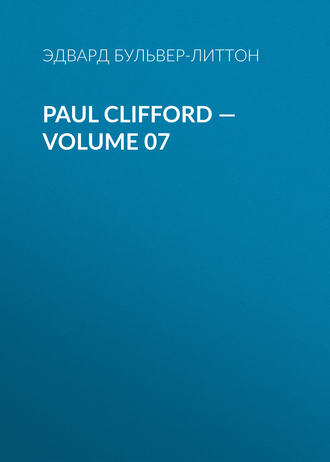
Эдвард Бульвер-Литтон
Paul Clifford — Volume 07
"Among the higher circles, we understand, the rumour has gone forth that Sir William Brandon is to be recalled to his old parliamentary career in a more elevated scene. So highly are this gentleman's talents respected by his Majesty and the ministers, that they are, it is reported, anxious to secure his assistance in the House of Lords!"
When Dummie had spelt his "toilsome march" through the first of the above extracts he turned round to the tall stranger, and, eying him with a sort of winking significance, said,—
"So MacGrawler peaches,—blows the gaff on his pals, eh! Vel, now, I always suspected that 'ere son of a gun! Do you know, he used to be at the Mug many 's a day, a teaching our little Paul, and says I to Piggy Lob, says I, 'Blow me tight, but that cove is a queer one! and if he does not come to be scragged,' says I, 'it vill only be because he'll turn a rusty, and scrag one of his pals!' So you sees" (here Dummie looked round, and his voice sank into a whisper),—"so you sees, Meester Pepper, I vas no fool there!"
Long Ned dropped his pipe, and said sourly and with a suspicious frown, "What! you know me?"
"To be sure and sartin I does," answered little Dummie, walking to the table where the robber sat. "Does not you know I?"
Ned regarded the interrogator with a sullen glance, which gradually brightened into knowledge. "Ah!" said he, with the air of a Brummel, "Mr. Bummie, or Dummie, I think, eh! Shake a paw,—I'm glad to see you. Recollect the last time I saw you, you rather affronted me. Never mind. I dare say you did not mean it."
Encouraged by this affable reception from the highwayman, though a little embarrassed by Ned's allusion to former conduct on his part, which he felt was just, Dummie grinned, pushed a stool near Ned, sat himself down, and carefully avoiding any immediate answer to Ned's complaints, rejoined,—
"Do you know, Meester Pepper, you struck I all of a heap? I could not have s'posed as how you'd condescend nowadays to come to the Mug, vhere I never seed you but once afore. Lord love ye, they says as 'ow you go to all the fine places in ruffles, with a pair of silver pops in your vaistcoat pocket! Vy, the boys hereabout say that you and Meester Tomlinson, and this 'ere poor devil in quod, vere the finest gemmen in town; and, Lord, for to think of your ciwility to a pitiful ragmerchant, like I!"
"Ah!" said Ned, gravely, "there are sad principles afloat now. They want to do away with all distinctions in ranks,—to make a duke no better than his valet, and a gentleman highwayman class with a filcher of fogles.' But, damme, if I don't think misfortune levels us all quite enough; and misfortune brings me here, little Dummie."
"Ah! you vants to keep out of the vay of the bulkies!" "Right. Since poor Lovett was laid by the heels, which I must say was the fault of his own deuced gentlemanlike behaviour to me and Augustus (you've heard of Guz, you say), the knot of us seems quite broken. One's own friends look inclined to play one false; and really, the queer cuffins hover so sharply upon us that I thought it safe to duck for a time. So I have taken a lodging in a cellar, and I intend for the next three months to board at the Mug. I have heard that I may be sure of lying snug here. Dummie, your health! Give us the baccy."
"I say, Meester Pepper," said Dummie, clearing his throat, when he had obeyed the request, "can you tell I, if so be you 'as met in your travels our little Paul? Poor chap! You knows as 'ow and vy he was sent to quod by Justice Burnflat. Vel, ven he got out, he vent to the devil, or summut like it, and ve have not 'card a vord of him since. You 'members the lad,—a 'nation fine cull, tall and straight as a harrow!"
"Why, you fool," said Ned, "don't you know"—then checking himself suddenly, "Ah! by the by, that rigmarole oath! I was not to tell; though now it's past caring for, I fear! It is no use looking after the seal when the letter's burned."
"Blow me," cried Dunnaker, with unaffected vehemence, "I sees as how you know vot's come of he! Many's the good turn I'll do you, if you vill but tell I."
"Why, does he owe you a dozen bobs; or what, Dummie?" said Ned.
"Not he,—not he," cried Dummie.
"What then, you want to do him a mischief of some sort?"
"Do little Paul a mischief!" ejaculated Dummie; "vy, I've known the cull ever since he was that high! No, but I vants to do him a great sarvice, Meester Pepper, and myself too,—and you to boot, for aught that I know, Meester Pepper."
"Humph!" said Ned,—"humph! what do you mean? I do, it is true, know where Paul is; but you must tell me first why you wish to know, otherwise you may ask your grandfather for me."
A long, sharp, wistful survey did Mr. Dummie Dunnaker cast around him before he rejoined. All seemed safe and convenient for confidential communication. The supine features of Mrs. Lobkins were hushed in a drowsy stupor; even the gray cat that lay by the fire was curled in the embrace of Morpheus. Nevertheless, it was in a close whisper that Dummie spoke.
"I dares be bound, Meester Pepper, that you 'members vell ven Harry Cook, the great highvayman,—poor fellow! he's gone vhere ve must all go,— brought you, then quite a gossoon,' for the first time to the little back parlour at the Cock and Hen, Dewereux Court?"
Ned nodded assent.
"And you 'members as how I met Harry and you there, and I vas all afeard at you,—'cause vy? I had never seen you afore, and ve vas a going to crack a swell's crib. And Harry spoke up for you, and said as 'ow though you had just gone on the town, you was already prime up to gammon. You 'members, eh?"
"Ay, I remember all," said Ned; "it was the first and only house I ever had a hand in breaking into. Harry was a fellow of low habits; so I dropped his acquaintance, and took solely to the road, or a chance ingenuity now and then. I have no idea of a gentleman turning cracksman."
"Vel, so you vent vith us, and ve slipped you through a pane in the kitchen-vindow. You vas the least of us, big as you be now; and you vent round and opened the door for us; and ven you had opened the door, you saw a voman had joined us, and you were a funked then, and stayed vithout the crib, to keep vatch vhile ve vent in."
"Well, well," cried Ned, "what the devil has all this rigmarole got to do with Paul?"
"Now don't be glimflashy, but let me go on smack right about. Vell, ven ve came out, you minds as 'ow the voman had a bundle in her arms, and you spake to her; and she answered you roughly, and left us all, and vent straight home; and ve vent and fenced the swag' that wery night and afterwards napped the regulars. And sure you made us laugh 'artily, Meester Pepper, when you said, says you, 'That 'ere voman is a rum blo" en.' So she vas, Meester Pepper!"
[The reader has probably observed the use made by Dummie and Mrs. Lobkins of Irish phraseology or pronunciation, This is a remarkable trait in the dialect of the lowest orders in London, owing, we suppose, to their constant association with emigrants from "the first flower of the earth." Perhaps it is a modish affectation among the gentry of St. Giles's, just as we eke out our mother- tongue with French at Mayfair.]
"Oh, spare me," said Ned, affectedly, "and make haste; you keep me all in the dark. By the way, I remember that you joked me about the bundle; and when I asked what the woman had wrapped in it, you swore it was a child. Rather more likely that the girl, whoever she was, would have left a child behind her than carried one off!" The face of Dummie waxed big with conscious importance.
"Vell, now, you would not believe us; but it vas all true. That 'ere bundle vas the voman's child,—I s'pose an unnatural von by the gemman; she let us into the 'ouse on condition we helped her off vith it. And, blow me tight, but ve paid ourselves vel for our trouble. That 'ere voman vas a strange cretur; they say she had been a lord's blowen; but howsomever, she was as 'ot-'eaded and hodd as if she had been. There vas old Nick's hown row made on the matter, and the revard for our [de]tection vas so great, that as you vas not much tried yet, Harry thought it best for to take you vith 'im down to the country, and told you as 'ow it vas all a flam about the child in the bundle!"
"Faith," said Ned, "I believed him readily enough; and poor Harry was twisted shortly after, and I went into Ireland for safety, where I stayed two years,—and deuced good claret I got there!"
"So, vhiles you vas there," continued Dummie, "poor Judy, the voman, died,—she died in this very 'ouse, and left the horphan to the [af]fection of Piggy Lob, who was 'nation fond of it surely! Oh! but I 'members vot a night it vas ven poor Judy died; the vind vistled like mad, and the rain tumbled about as if it had got a holiday; and there the poor creature lay raving just over 'ed of this room we sits in! Laus-a- me, vat a sight it vas!"
Here Dummie paused, and seemed to recall in imagination the scene he had witnessed; but over the mind of Long Ned a ray of light broke slowly.
"Whew!" said he, lifting up his forefinger, "whew! I smell a rat; this stolen child, then, was no other than Paul. But, pray, to whom did the house belong? For that fact Harry never communicated to me. I only heard the owner was a lawyer, or parson, or some such thing."
"Vy now, I'll tell you, but don't be glimflashy. So, you see, ven Judy died, and Harry was scragged, I vas the only von living who vas up to the secret; and vhen Mother Lob vas a taking a drop to comfort her vhen Judy vent off, I hopens a great box in which poor Judy kept her duds and rattletraps, and surely I finds at the bottom of the box hever so many letters and sick like,—for I knew as 'ow they vas there; so I vhips these off and carries 'em 'ome with me, and soon arter, Mother Lob sold me the box o' duds for two quids—'cause vy? I vas a rag-merchant. So now I 'solved, since the secret vas all in my hown keeping, to keep it as tight as vinkey; for first, you sees as 'ow I vas afeard I should be hanged if I vent for to tell,—'cause vy? I stole a vatch, and lots more, as vell as the hurchin; and next I vas afeard as 'ow the mother might come back and haunt me the same as Sall haunted Villy, for it vas a 'orrid night ven her soul took ving. And hover and above this, Meester Pepper, I thought summut might turn hup by and by, in vhich it vould be best for I to keep my hown counsel and nab the revard, if I hever durst make myself known."
Here Dummie proceeded to narrate how frightened he had been lest Ned should discover all, when (as it may be remembered, Pepper informed Paul at the beginning of this history) he encountered that worthy at Dame Lobkins's house; how this fear had induced him to testify to Pepper that coldness and rudeness which had so enraged the haughty highwayman; and how great had been his relief and delight at finding that Ned returned to the Mug no more. He next proceeded to inform his new confidant of his meeting with the father (the sagacious reader knows where and when), and of what took place at that event. He said how, in his first negotiation with the father, prudently resolving to communicate drop by drop such information as he possessed, he merely, besides confessing to a share in the robbery, stated that he thought he knew the house, etc., to which the infant had been consigned,—and that, if so, it was still alive; but that he would inquire. He then related how the sanguine father, who saw that hanging Dummie for the robbery of his house might not be half so likely a method to recover his son as bribery and conciliation, not only forgave him his former outrage, but whetted his appetite to the search by rewarding him for his disclosure. He then proceeded to state how, unable anywhere to find Paul, or any trace of him, he amused the sire from time to time with forged excuses; how, at first, the sums he received made him by no means desirous to expedite a discovery that would terminate such satisfactory receipts; how at length the magnitude of the proffered reward, joined to the threats of the sire, had made him become seriously anxious to learn the real fate and present "whereabout" of Paul; how, the last time he had seen the father, he had, by way of propitiation and first fruit, taken to him all the papers left by the unhappy mother and secreted by himself; and how he was now delighted to find that Ned was acquainted with Paul's address. Since he despaired of finding Paul by his own exertions alone, he became less tenacious of his secret; and he now proffered Ned, on discovery of Paul, a third of that reward the whole of which he had once hoped to engross.
Ned's eyes and mouth opened at this proposition. "But the name,—the name of the father? You have not told me that yet!" cried he, impatiently.
"Noa, noa!" said Dummie, archly, "I does n't tell you all, till you tells I summut. Vhere's little Paul, I say; and vhere be us to get at him?"
Ned heaved a sigh.
"As for the oath," said he, musingly, "it would be a sin to keep it, now that to break it can do him no harm, and may do him good, especially as, in case of imprisonment or death, the oath is not held to be binding; yet I fear it is too late for the reward. The father will scarcely thank you for finding his son!—-Know, Dummie, that Paul is in jail, and that he is one and the same person as Captain Lovett!" Astonishment never wrote in more legible characters than she now displayed on the rough features of Dummie Dunnaker. So strong are the sympathies of a profession compared with all others, that Dummie's first confused thought was that of pride. "The great Captain Lovett!" he faltered.
"Little Paul at the top of the profession! Lord, Lord! I always said as how he'd the hambition to rise!"
"Well, well, but the father's name?"
At this question the expression of Dummie's face fell; a sudden horror struggled to his eyes—
CHAPTER XXXV
Why is it that at moments there creeps over us an awe, a terror, overpowering but undefined? Why is it that we shudder without a cause, and feel the warm life-blood stand still in its courses? Are the dead too near?
FALKLAND
Ha! sayest thou! Hideous thought, I feel it twine
O'er my iced heart, as curls around his prey
The sure and deadly serpent!
. . . . . . . . . . . .
What! in the hush and in the solitude
Passed that dread soul away?
Love and Hatred.
The evening prior to that morning in which the above conversation occurred, Brandon passed alone in his lodging at ————. He had felt himself too unwell to attend the customary wassail, and he sat indolently musing in the solitude of the old-fashioned chamber to which he was consigned. There, two wax-candles on the smooth, quaint table dimly struggled against the gloom of heavy panels, which were relieved at unfrequent intervals by portraits in oaken frames, dingy, harsh, and important with the pomp of laced garments and flowing wigs. The predilection of the landlady for modern tastes had, indeed, on each side of the huge fireplace suspended more novel masterpieces of the fine arts. In emblematic gorgeousness hung the pictures of the four Seasons, buxom wenches all, save Winter, who was deformedly bodied forth in the likeness of an aged carle. These were interspersed by an engraving of Lord Mauleverer, the lieutenant of the neighbouring county, looking extremely majestical in his peer's robes; and by three typifications of Faith, Hope, and Charity,—ladies with whom it may be doubted if the gay earl ever before cultivated so close an intimacy. Curtains, of that antique chintz in which fasces of stripes are alternated by rows of flowers, filled the interstices of three windows; a heavy sideboard occupied the greater portion of one side of the room; and on the opposite side, in the rear of Brandon, a vast screen stretched its slow length along, and relieved the unpopulated and as it were desolate comfort of the apartment.
Pale and imperfectly streamed the light upon Brandon's face, as he sat in his large chair, leaning his cheek on one hand, and gazing with the unconscious earnestness of abstraction on the clear fire. At that moment a whole phalanx of gloomy thought was sweeping in successive array across his mind. His early ambition, his ill-omened marriage, the causes of his after-rise in the wrong-judging world, the first dawn of his reputation, his rapid and flattering successes, his present elevation, his aspiring hope of far higher office, and more patrician honours,—all these phantoms passed before him in checkered shadow and light; but ever with each stalked one disquieting and dark remembrance,—the loss of his only son.
Weaving his ambition with the wish to revive the pride of his hereditary name, every acquisition of fortune or of fame rendered him yet more anxious to find the only one who could perpetuate these hollow distinctions to his race.
"I shall recover him yet!" he broke out suddenly and aloud. As he spoke, a quick, darting, spasmodic pain ran shivering through his whole frame, and then fixed for one instant on his heart with a gripe like the talons of a bird; it passed away, and was followed by a deadly sickness. Brandon rose, and filling himself a large tumbler of water, drank with avidity. The sickness passed off like the preceding pain; but the sensation had of late been often felt by Brandon, and disregarded,—for few persons were less afflicted with the self-torture of hypochondria; but now, that night, whether it was more keen than usual, or whether his thought had touched on the string that jars naturally on the most startling of human anticipations, we know not, but, as he resumed his seat, the idea of his approaching dissolution shot like an ice-bolt through his breast.
So intent was this scheming man upon the living objects of the world, and so little were his thoughts accustomed to turn toward the ultimate goal of all things, that this idea obtruding itself abruptly upon him, startled him with a ghastly awe. He felt the colour rush from his cheek, and a tingling and involuntary pain ran wandering through the channels of his blood, even from the roots of the hair to the soles of his feet. But the stern soul of Brandon was not one which shadows could long affright. He nerved himself to meet the grim thought thus forced upon his mental eye, and he gazed on it with a steady and enduring look.
"Well," thought he, "is my hour coming, or have I yet the ordinary term of mortal nature to expect? It is true, I have lately suffered these strange revulsions of the frame with somewhat of an alarming frequency; perhaps this medicine, which healed the anguish of one infirmity, has produced another more immediately deadly. Yet why should I think this? My sleep is sound and calm, my habits temperate, my mind active and clear as in its best days. In my youth I never played the traitor with my constitution; why should it desert me at the very threshold of my age? Nay, nay, these are but passing twitches, chills of the blood that begins to wax thin. Shall I learn to be less rigorous in my diet? Perhaps wine may reward my abstinence in avoiding it for my luxuries, by becoming a cordial to my necessities! Ay, I will consult,—I will consult, I must not die yet. I have—let me see, three—four grades to gain before the ladder is scaled. And, above all, I must regain my child! Lucy married to Mauleverer, myself a peer, my son wedded to-whom? Pray God he be not married already! My nephews and my children nobles! the house of Brandon restored, my power high in the upward gaze of men, my fame set on a more lasting basis than a skill in the quirks of law,—these are yet to come; these I will not die till I have enjoyed! Men die not till their destinies are fulfilled. The spirit that swells and soars within me says that the destiny of William Brandon is but half begun!"
With this conclusion, Brandon sought his pillow. What were the reflections of the prisoner whom he was to judge? Need we ask? Let us picture to ourselves his shattered health, the languor of sickness heightening the gloom which makes the very air of a jail; his certainty of the doom to be passed against him; his knowledge that the uncle of Lucy Brandon was to be his judge, that Mauleverer was to be his accuser, and that in all human probability the only woman he had ever loved must sooner or later learn the criminality of his life and the ignominy of his death; let us but glance at the above blackness of circumstances that surrounded him, and it would seem that there is but little doubt as to the complexion of his thoughts! Perhaps, indeed, even in that terrible and desolate hour one sweet face shone on him, "and dashed the darkness all away." Perhaps, too, whatever might be the stings of his conscience, one thought, one remembrance of a temptation mastered and a sin escaped, brought to his eyes tears that were sweet and healing in their source. But the heart of a man in Clifford's awful situation is dark and inscrutable; and often when the wildest and gloomiest external circumstances surround us, their reflection sleeps like a shadow, calm and still upon the mind.
The next morning, the whole town of (a town in which, we regret to say, an accident once detained ourself for three wretched days, and which we can, speaking therefore from profound experience, assert to be in ordinary times the most melancholy and peopleless-looking congregation of houses that a sober imagination can conceive) exhibited a scene of such bustle, animation, and jovial anxiety as the trial for life or death to a fellow-creature can alone excite in the phlegmatic breasts of the English. Around the court the crowd thickened with every moment, until the whole marketplace in which the townhall was situated became one living mass. The windows of the houses were filled with women, some of whom had taken that opportunity to make parties to breakfast; and little round tables, with tea and toast on them, caught the eyes of the grinning mobists as they gaped impatiently upwards.
"Ben," said a stout yeoman, tossing up a halfpenny, and catching the said coin in his right hand, which he immediately covered with the left,— "Ben, heads or tails that Lovett is hanged; heads hanged, tails not, for a crown."
"Petticoats, to be sure," quoth Ben, eating an apple; and it was heads!
"Damme, you've lost!" cried the yeoman, rubbing his rough hands with glee.
It would have been a fine sight for Asmodeus, could he have perched on one of the house tops of the market-place of ————, and looked on the murmuring and heaving sea of mortality below. Oh! the sight of a crowd round a court of law or a gibbet ought to make the devil split himself with laughter.
While the mob was fretting, and pushing, and swearing, and grinning, and betting, and picking pockets, and trampling feet, and tearing gowns, and scrambling nearer and nearer to the doors and windows of the court, Brandon was slowly concluding his abstemious repast, preparatory to attendance on his judicial duties. His footman entered with a letter. Sir William glanced rapidly over the seal (one of those immense sacrifices of wax used at that day), adorned with a huge coat-of-arms, surmounted with an earl's coronet, and decorated on either side with those supporters so dear to heraldic taste. He then tore open the letter, and read as follows:—
MY DEAR SIR WILLIAM,—You know that in the last conversation I had the Honour to hold with you I alluded, though perhaps somewhat distantly, to the esteem which his Majesty had personally expressed for your principles and talents, and his wish to testify it at the earliest opportunity. There will be, as you are doubtless aware, an immediate creation of four peerages. Your name stands second on the list. The choice of title his Majesty graciously leaves to you; but he has hinted that the respectable antiquity of your family would make him best pleased were you to select the name of your own family-seat, which, if I mistake not, is Warlock. You will instruct me at your leisure as to the manner in which the patent should be made out, touching the succession, etc. Perhaps (excuse the license of an old friend) this event may induce you to forsake your long- cherished celibacy. I need not add that this accession of rank will be accompanied by professional elevation. You will see by the papers that the death of ————leaves vacant the dignity of Chief Baron; and I am at length empowered to offer you a station proportioned to your character and talents.
With great consideration, believe me, my dear Sir, Very truly yours,
Private and Confidential.
Brandon's dark eye glanced quickly from the signature of the premier, affixed to this communication, towards the mirror opposite him. He strode to it, and examined his own countenance with a long and wistful gaze. Never, we think, did youthful gallant about to repair to the trysting-spot, in which fair looks make the greatest of earthly advantages, gaze more anxiously on the impartial glass than now did the ascetic and scornful judge; and never, we ween, did the eye of the said gallant retire with a more satisfied and triumphant expression.







